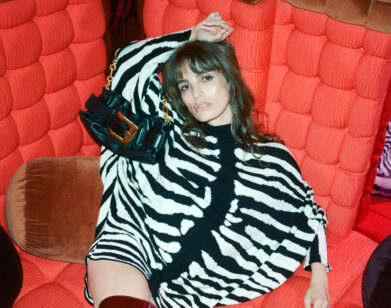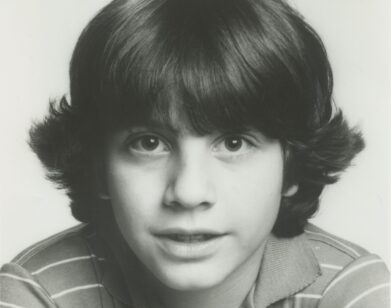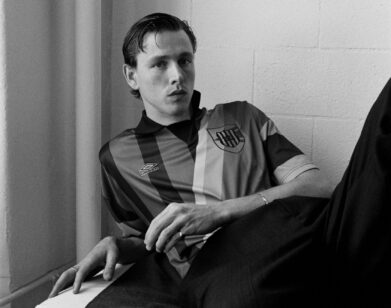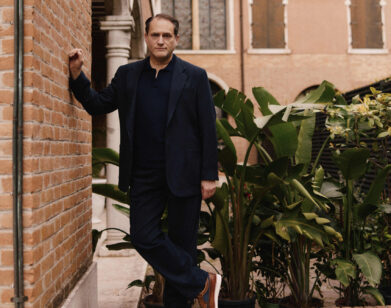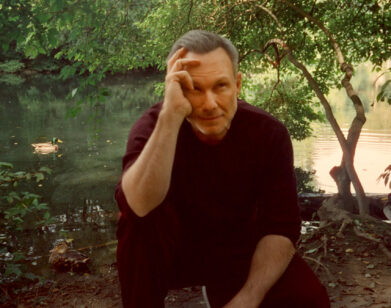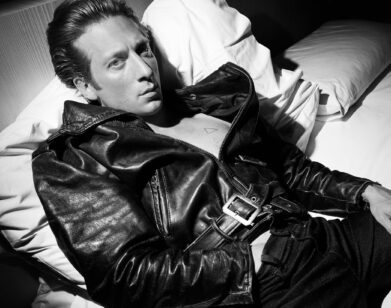‘Round Midnight: Woody Allen’s Time Machine
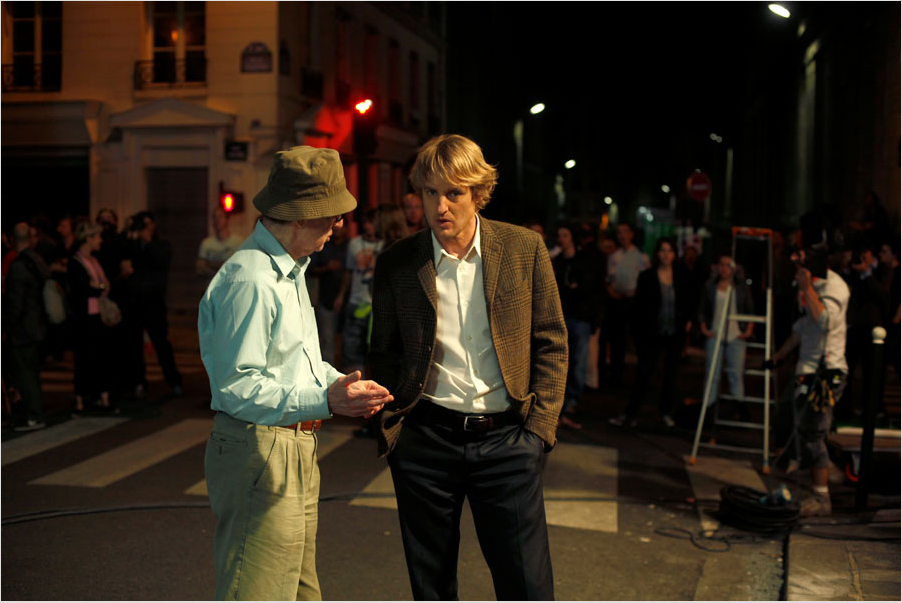
WOODY ALLEN AND OWEN WILSON ON THE SET OF MIDNIGHT IN PARIS.
“I can’t play the love interest anymore,” Woody Allen lamented into his microphone earlier this week at a New York press conference for his film Midnight in Paris. “And of course this is tremendously frustrating. I have to play Pops, the backstage doorman at the theater, or something like that.” While Allen’s gripes about aging resemble the sort of comic yammering that have piloted some of his most beloved films, his concession to hiring a younger male lead is a gradual one. Enter Owen Wilson as Gil, a successful but uninspired Hollywood screenwriter aching to publish a novel—who is vacationing in Paris his wife, Inez (Rachel McAdams), and her parents—looks, talks, and gestures like Alvy, Isaac, or Mickey Sachs. He’s thin, with shaggy and swept hair, general unsettledness, lilting inflections, tweed blazers and khaki trousers, and in some scenes, shrunken ties and Woody-sized shirts on a Wilson-sized body. Even the manner in which Gil grabs Inez and embraces her on the bridge at Giverny or the way Wilson sits in a muddled stupor on the edge of his hotel bed, or speaks with his hands but walks with them in his pockets—Allen has, to some extent cast a version of himself.
But it’s the film’s classic portrait of romance, not just between lovers, but with the city itself—a Manhattan-type opening sequence—with nostalgia and subsequent time travel, with the quest for a life of great élan, that mark Midnight in Paris as a light, but very enjoyable return for Allen. Even Darius Khnondji’s cinematography is enchanted, Allen noted. “I like the weather to be flat, grey, and the colors to be autumnal: yellows, beige, brown, tan, gold, and intensely red. If you go to a restaurant with your wife or your girlfriend or something, and it’s red wallpaper and turn-of-the-century lights, you both look beautiful. Whereas if you’re at a seafood restaurant, and the lights are up, everybody looks terrible. It’s very flattering and very lovely, and that’s the fundamental aesthetic for the camerawork.”
While the film centers around Gil—who at midnight walks to Rue Montagne St. Genevieve and hops in a car that transports him to the past—the film’s supporting characters, especially the women, add a gameness and nerve that send Wilson running or keep him coming back for more. McAdams as Inez, who wears a uniform of belted shirt-dresses and wedge platforms, and who refuses to walk romantically in the rain, and who hasn’t yet realized that she is no longer in love with Gil, is in most scenes standing with her hands on her hips and her eyes about to roll, or her chest about to rise and deflate in frustration. McAdams’ bullying body language is comic instead of loathsome. Then there’s Marion Cotillard, who plays a seductive 1920s flapper, Adriana. Perhaps it’s that we’ve seen Cotillard in various period films, or that her round, petal features are an immediate vehicle to that particular time, but with pleated hair and headbands, garçonne dresses, and art deco accents, her role as both Picasso’s muse and Gil’s rescue fits. Rounding out the cast of female performers are Nina Arianda, Léa Seydoux, Alison Pill (as Zelda Fitzgerald who pops a Valium from the future), France’s First Lady, Carla Bruni, as a museum guide, and Kathy Bates as Gert (Stein). In response to his actors’ wonderful performances, Allen jokes about his laissez-faire attitude on set: “As long as the thing gets done believably on screen, as long as they make it real or exciting or amusing, I’m very, very happy… to take credit for it later.”
When asked about time travel—and then, later, his future plans to return to New York-based stories—the 75-year-old’s affection for his creature comforts was clear. “It’s a tricky thing, because if you go back in time, the women were dying at childbirth and people had tuberculosis, and you’d go the dentist and they’d drill and it killed you. I would like to be able to travel back for the day—go back to the Belle Époque at lunch, and then come home.” Allen went on to talk about his next project, set for production this summer in Rome, which, like time travel, will take him away from some of his favorite things. “I’m not going to be able to see any baseball, that’s a big loss for me. I will have three months of a hotel shower—I have a great shower at home, it comes out hard and hot. And then you get to a hotel, especially in a foreign country, so it’s nice to work at home: my own bed, my own house, and all of my surrounding pharmaceuticals.”
MIDNIGHT IN PARIS IS OUT IN LIMITED RELEASE TODAY.

